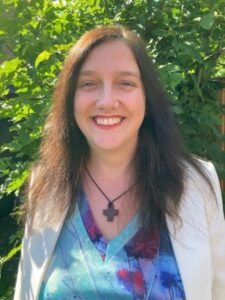The Twenty-Fourth Sunday after Pentecost (Proper 26), November 3, 2024
October 7, 2024 | by Doral Hayes
| Reading 1 | Reading 2 | Reading 3 | Reading 4 | Reading 1 Alt | Reading 2 Alt |
|---|---|---|---|---|---|
| Ruth 1:1-18 | Psalm 146 | Hebrews 9:11-14 | Mark 12:28-34 | Psalm 119:1-8 | Deuteronomy 6:1-9 |
The overriding theme of this weeks readings is the importance of Gods command to love, repeatedly we are told to ‘love the Lord your God’. We are reminded that to love God and our neighbour is the greatest commandment and that we are to show this love to others in all our behaviour. This love in action is then sung about in the Psalms, both in our praise of God and the fair just treatment of others and we see an examples of love through the story of Ruth.
The book of Deuteronomy is often associated with law, not love, but this passage takes us to heart of why Deuteronomy is still relevant to Christian communities today. Deuteronomy does not present a simple list of rules to follow but rather a more relational narrative that speaks of how we are to love God and each other. This particular passage is deeply rooted within the Judeo-Christian tradition and verses 4-6 form what is called the Shema prayer. The word Shema, when most directly translated from the Hebrew means “to hear” and is taken from the words “Hear, Oh Israel” in Deuteronomy 6 verse 4. The Shema prayer is offered twice a day in Jewish worship, and once a week as part of the Roman Catholic pattern of prayer. This passage, and the prayer, offers an encouragement to love God, to live a life of love at all times, when we sit, when we walk and when we lie down and to teach this way of love to children. It also reminds us of the importance of deeply listening so we can really ‘hear’ one another.
The character of Ruth has long been praised, her virtues expressed as part of the Christian and Jewish tradition for generations. Chinese feminist Christian theologian Kwok Pui-Lan challenges the traditional reading of the book of Ruth by asking the question ‘Who Goes Home?’ Pui-Lan uses a post-colonial hermeneutic of suspicion and argues that Orpah could be perceived as the woman in this story who went home. Orpah returned to her family and culture and could be read as a virtuous and loyal woman while Ruth could be seen as a woman who abandoned her people when she chose to stay with Naomi. Ruth is described as being like Pocahontas who embraced and became part of the dominant culture. This different reading of the Ruth passage shows the complexity of living a life of love as the actions of both women can be read as showing love for others. It is a reminder of cultural baggage we all bring to reading scripture and points to the importance of humility, grace and a lack of judgement as we walk together as Christian communities seeking to live lives of love.
Optional Resources
This months lectionary integrates scripture with aspects of popular culture. When we engage with scripture or with a church service, we take with us those things that influence us from broader life and culture. Below are some suggestions that came to me from as a I reflected on these passages; this list is by no means exhaustive. If you find them useful please do use them as you prepare to lead worship this coming week. May they bless you.
Books and Films: Pocahontas (film). The Way (film). The Lord of the Rings by J R Tolkien.
Music: You’ve Got A Friend by Carol King. Don’t Give Up by Peter Gabriel. We Cannot Measure How You Heal by John Bell.
Reference: Pui-Lan, K. (2005) Postcolonial Imagination and Feminist Theology. London; SCM Canterbury Press.
 Doral Hayes is the Principal Officer for Ecumenical Development and Relations at Churches Together in England and is a Licenced Lay Minister in the Oxford Diocese of the Church of England. Doral holds a MA in Contemporary Christian Theology from Newman University, Birmingham and is currently undertaking doctoral research in ecumenical theology at the University of Roehampton, London. Doral is a contributor to Preaching the Uncontrolling Love of God, edited by Jeff Wells, Thomas Jay Oord, et. al. She lives in Buckinghamshire, England with her husband, two teenage children and a crazy whippet.
Doral Hayes is the Principal Officer for Ecumenical Development and Relations at Churches Together in England and is a Licenced Lay Minister in the Oxford Diocese of the Church of England. Doral holds a MA in Contemporary Christian Theology from Newman University, Birmingham and is currently undertaking doctoral research in ecumenical theology at the University of Roehampton, London. Doral is a contributor to Preaching the Uncontrolling Love of God, edited by Jeff Wells, Thomas Jay Oord, et. al. She lives in Buckinghamshire, England with her husband, two teenage children and a crazy whippet.
